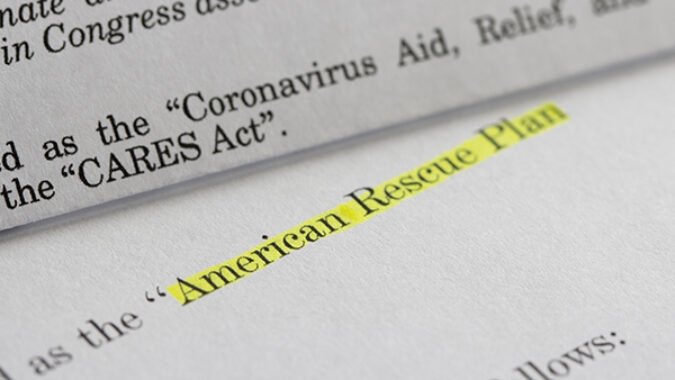NJBIA is asking the Murphy administration to direct the billions of dollars in federal COVID-19 relief funds to pro-growth initiatives that will expand the New Jersey’s economy, avert future tax increases, support struggling businesses, and encourage the unemployed to go back to work.
The plan was presented by NJBIA Vice President of Government Affairs Christopher Emigholz on Tuesday at the first of two online public forums organized by the Governor’s Office on how to use New Jersey’s share of the $2 trillion American Rescue Plan Act (ARP) signed by President Joe Biden on March 11. About one-third of New Jersey’s $6 billion share is allocated in the FY22 state budget for programs such as rental and utility assistance for residents, but the remaining federal funds are unspent.
Noting the New Jersey’s 7.3% unemployment rate, which is double the state’s pre-pandemic jobless rate and now one of the highest in the nation, Emigholz said it was “critical that we use ARP funds with our economy in mind.” He stressed the need to avoid creating new permanent state programs that cannot be supported without tax increases once the federal money is gone.
“Federal funds should be spent to maximize return on investment and economic growth to generate more tax revenues without increasing taxes,” Emigholz said. He suggested using some COVID-19 relief aid to invest in infrastructure projects that create jobs and stimulate the economy, including transportation, higher education facilities, school buildings, clean water, energy, and telecommunications.
The federal money should also be used to pay down the debt in the state Unemployment Insurance Trust Fund to reduce the tax liability employers face and because of pandemic layoffs and free up funds so businesses can hire workers, increase wages and grow businesses.
“Otherwise, employers will have to divert substantial resources to cover the UI benefits that were necessary for workers who were laid off due to state-mandated COVID-19 restrictions on businesses,” Emigholz said, noting that payroll tax increases are a tax on jobs and undermine new hiring and economic growth.
The New Jersey Economic Development Authority, which has done an outstanding job supporting small businesses during the pandemic, still needs more resources, Emigholz said. NJEDA has helped over 60,000 small businesses to date, but that represents only 7% of New Jersey businesses, many of which lost almost one-third of their revenue because of the pandemic, he said.
“NJBIA thanks Governor Murphy and the Legislature for providing the EDA as much funding as it has, but we urge that it continue to do so by expanding on the size of the awards and size of employers eligible where appropriate,” Emigholz said.
New Jersey should also be using some of the federal COVID-19 relief funding to address the current hiring crisis by providing funding for employers and employees that incentivizes people to return to work instead of continuing to collect unemployment benefits, Emigholz said. Employer tax incentives could help businesses provide signing bonuses and retention bonuses for employees, and legislation like the federal bill proposed by Rep. Mikie Sherril, D-NJ, would provide people who reenter the workforce with weekly benefits equal to 60% of their federal unemployment benefit.
NJBIA also supports S-3759/A-5735, introduced by Senator Vin Gopal (D-11) and Assemblyman Vincent Mazzeo (D-2), which would provide tax credits for small businesses paying entry-level workers, Emigholz said. State funding for an educational campaign to promote the return to work and the limits of UI benefits could also make a big difference, he said.
To read Emigholz’s entire public testimony, go here.


